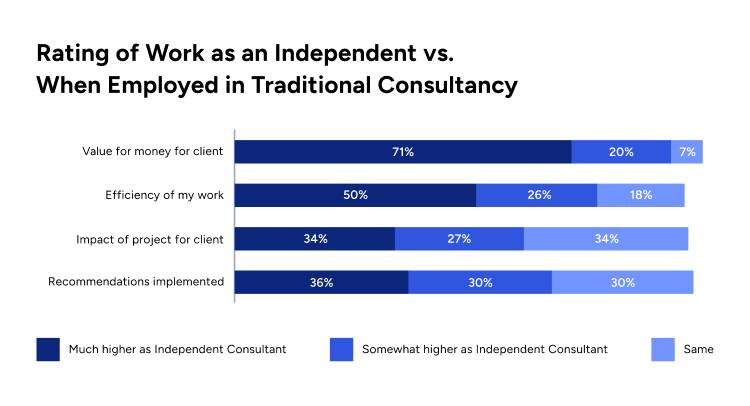Why Hire Independent Consultants for Your Business



An independent consultant is a professional who offers advisory services in their area of expertise on a contractual basis. These consultants are typically experienced experts who analyze strategic, operational, or technical issues for their clients and provide actionable recommendations.
From 2020 to 2022, the total number of freelancers increased by 69%, with full-time freelancers growing from 13.6 million in 2020 to 21.6 million in 2022. Additionally, as companies navigate economic volatility and the need for specialized skills, 90% of corporate leaders have shown interest in hiring independent consultants to address these challenges effectively.
This article explores why companies are increasingly opting for independent consultants over traditional consulting firms, answering the following questions:
- What drives the shift towards independent consultants?
- What specific advantages do they offer over traditional consulting firms?
- How do independent consultants deliver superior value?
The Evolving Landscape of Consulting: The Rise of Independent Consultants
The management consulting industry plays a crucial role in guiding businesses through strategic decisions, operational improvements, and technological advancements. The global management consulting market is estimated to be valued at over $1 trillion, growing at a compound annual growth rate (CAGR) of 8% by 2028.
Major players like McKinsey, BCG, and Bain, collectively known as MBB, are key drivers of this growth. However, attrition rates within these firms tell a different story. Annually, prestigious consulting firms face churn rates between 18% and 20%, with only one in six new hires at McKinsey remaining for more than five years.
This turnover has resulted in a wide network of former consultants, with MBB firms alone contributing 66,000 per year, and when including Deloitte, Accenture, and EY, the number exceeds 500,000. Many of them work for other firms or former clients, but the flexibility and autonomy offered by the freelance market are becoming increasingly attractive.
As of 2024, an estimated 64% of Americans, or 38% of the U.S. workforce, are engaged in freelance work. Moreover, approximately 20% of management consultants and business analysts in the U.S. are self-employed. In the UK, this percentage is significantly higher, with 31% of management consultants operating as self-employed professionals. In light of this, shifting to independent consultants emerges as a strategic decision for companies aiming to optimize costs and enhance operational flexibility.
Why Companies Are Shifting to Independent Consultants
In parallel with the rise of Consulting Platforms, independent consultants offer companies flexibility and cost efficiency without long-term commitments associated with full-time employees. Additionally, they provide significant financial advantages and flexibility over traditional consulting firms, offering competitive pricing and high-level expertise with minimal overhead costs. Some benefits include:
Cost Savings with Enhanced Productivity
Independent consultants cost significantly less than traditional consultancy firms. Experienced independent consultants have lower training costs and in the case of remote consultants, no overhead expenses. Organizations can save up to 70% on consulting costs due to the lower overheads and flexible pricing models offered by freelancers. For instance, a standard growth strategy project in the US might cost $75,000 with independent consultants compared to $272,000 with a traditional firm, resulting in a 72% savings.
These savings are achieved while maintaining or even improving the quality of work delivered. In fact, 91% of independent consultants reported they deliver better value for money compared to traditional consulting firms. Additionally, 76% of these consultants claimed they work more efficiently, and 66% noted that their recommendations are more likely to be implemented by clients.

Addressing capacity gaps
Independent consultants effectively address capacity gaps within organizations by providing specialized skills on-demand, a crucial advantage over traditional consulting firms. In fact, the traditional offering phase for consulting firms can take up to 43 days to fill a role, which is significantly longer than the rapid onboarding of independent consultants. Platforms like Consultport facilitate this process, ensuring clients are matched with the right consultants within 48 hours.
Moreover, also consulting firms are increasingly leveraging independent consultant networks to address a significant shortage of specialized skills. For instance, around 50% of consulting firms in Saudi Arabia and the UAE report difficulties in finding specialized skills locally, and so they are tapping independent consultants networks. Specifically, there has been an estimated 20-30% increase in the use of independent consultants from 2020. This surge is driven by the need to address capacity challenges, reduce fixed costs, and access specialized expertise quickly.
Pay for Expertise instead of Brand
Independent consultants get paid directly and proportionally for their work based on their experience and deliverables for the organization. For organizations, this approach offers greater value for their budget while ensuring working with individuals most suited to their project requirements. A notable 31% of organizations plan to engage independent consultants for data analytics, and 29% for digital technology, looking for digital expertise (73%) and management consulting skills (71%).
Moreover, some industries have already turned to independent consultants rather than traditional consulting. For instance, in the retail sector, just 19% of 250 board-level executives surveyed in the UK, Germany, the Netherlands, and Switzerland were reporting they would rely on a traditional consultancy firm, while the majority prefers to engage with independent consultants.
Flexibility in Commitment Time
Engaging with independent management consultants offers significant flexibility compared to large consulting firms, which often require long-term contracts or retainer agreements. Independent consultants can be hired on an as-needed basis, allowing organizations to utilize their expertise for specific projects without the burden of long commitments. Projects with large consulting firms often extend to an average of twelve to eighteen months, whereas independent consultants offer also the possibility to engage within a shorter time span, with engagement lasting between three and six months.
Increased Agility
Independent consultants contribute significantly to company agility by enabling faster project initiation and execution. In fact, 39% of enterprises leverage contingent labor to increase productivity, and 36% use it to meet workload peaks and get tasks done more quickly. This agility allows companies to scale their workforce in response to market demands, thereby enhancing operational efficiency.
Over 90% of business leaders have shown interest in hiring independent consultants to move to a more agile workforce. As underlined by McKinsey, companies utilizing independent consultants can redeploy resources more dynamically, which is crucial for maintaining operational agility.
Case Study | Independent Consultants in Lean Management for Food Industry
The Challenge: Inefficient Manufacturing Process
The client, a company in the food industry and agriculture sector, was facing significant operational bottlenecks across its plants in Northern and Eastern Europe. These inefficiencies led to prolonged lead times and increased production costs.

The client sought an experienced consultant with a strong background in lean management and operations, specifically within the food industry, to develop and roll out an Asset Lean Management concept across all plants.
Role of Independent Consultants
Consultport proposed two strong consultants within 24 hours. The client interviewed both candidates and selected a former plant manager from the sugar industry, with extensive experience in lean management and Six Sigma certification. The consultant began working with the client team 48 hours after the initial request.
The Approach
The consultant implemented a structured approach to introduce lean manufacturing principles across the client’s operations in Northern and Eastern Europe. Initially, value stream mapping was conducted to scrutinize each step of the manufacturing process, identifying non-value-adding activities that contributed to delays and inefficiencies. The consultant traveled to different plants to ensure a thorough understanding of each site’s unique challenges.
In collaboration with plant teams, the consultant organized Kaizen workshops to foster a culture of continuous improvement. These workshops involved employees at all levels, generating actionable solutions to enhance efficiency. Additionally, the consultant implemented the 5S methodology—Sort, Set in order, Shine, Standardize, and Sustain—to enhance workplace organization and standardize procedures across the production floor.
The introduction of Just-In-Time (JIT) production practices played a crucial role in minimizing inventory levels, thereby reducing waste and streamlining the production process. Furthermore, the consultant conducted extensive training sessions to ensure staff were well-versed in lean principles and could sustain the improvements long-term. This included presenting lean management concepts and executing training programs directly at the plants.
The Findings
The detailed analysis uncovered several critical inefficiencies within the manufacturing process. Significant amounts of waste were identified, amounting to 25% of total production costs, stemming from poor workflow design and excessive handling of materials. The assessment revealed that workplace organization was suboptimal, leading to frequent delays and disruptions in the production flow, contributing to a 20% decrease in productivity. Moreover, inventory levels were found to be excessively high, with inventory turnover rates at only 3 times per year, contributing to increased holding costs and inefficiencies in inventory management.
Key Performance Indicators (KPIs) highlighted for improvement included lead time reduction, waste minimization, inventory turnover, and overall production efficiency. The findings underscored the necessity for a more streamlined and efficient approach to manufacturing, which was addressed through the strategic application of lean principles.
The Results
The implementation of lean manufacturing principles led to substantial improvements in the client’s operations in the first two years of implementation:
- Lead Time Reduction: Lead times were reduced by 20%, significantly improving the efficiency of the production process.
- Waste Reduction: Waste was reduced by 25%, resulting in lower operational costs.
- Inventory Turnover: Inventory turnover improved by 30%, reducing holding costs and freeing up working capital.
- Production Efficiency: Overall production efficiency increased, boosting the company’s capacity to meet market demand.
In terms of cost efficiency, the project delivered through Consultport provided significant savings compared to traditional consulting firms. The estimated cost for a similar project with a large consulting firm was approximately $750,000, whereas the cost with Consultport was $350,000, resulting in a saving of around 53%.
The company not only achieved a more streamlined and efficient manufacturing process but also realized a substantial return on investment, showcasing the effectiveness of independent consultants in driving strategic and operational improvements.
Conclusion
Companies are increasingly recognizing the advantages of flexibility, cost efficiency, and specialized expertise that independent consultants bring to the table.
The ability to address capacity gaps swiftly, provide personalized service, and deliver superior value at a fraction of the cost makes independent consultants a strategic asset in today’s competitive environment. As illustrated by the case study on lean manufacturing, engaging independent consultants through platforms like Consultport can lead to significant operational improvements and substantial cost savings. This shows that independent consultants are not only a viable alternative but often a more effective solution for modern business challenges.
FAQs on Independent Consultants & Related Resources
What are independent consultants?
Independent consultants are professionals who offer advisory services in their area of expertise on a contractual basis. Unlike traditional employees, they are self-employed and receive hourly or daily fees per project. They work on short-term or long-term projects, delivering tailored solutions to meet specific business goals. This model offers clients specialized skills and flexibility at competitive rates.
Is independent consulting worth it?
Yes, independent consulting is often worth it for both businesses and consultants. For businesses, it provides access to specialized expertise, flexibility in project engagement, and significant cost savings compared to traditional consulting firms. For consultants, it offers autonomy, a diverse range of projects, and the opportunity to work with various clients across different industries.
How do independent consultants differ from traditional consultants?
Independent consultants are self-employed professionals who typically work on a contract basis, whereas traditional consultants are usually employed by consulting firms. Independent consultants offer more flexibility, personalized service, and cost efficiency, while traditional consultants may provide a broader range of services through their firm's resources.
What are the benefits of hiring independent consultants?
Hiring independent consultants offers several benefits, including:
- Cost savings due to lower overheads and flexible pricing models.
- Access to specialized skills and expertise on demand.
- Flexibility in project duration and engagement terms.
- Faster onboarding and project initiation.
- Personalized service tailored to the specific needs of the business.
How can independent consultants address capacity gaps in an organization?
Independent consultants can address capacity gaps by providing specialized skills and expertise on a short-term basis. This allows organizations to fill immediate needs without the long-term commitment of hiring full-time employees. They can be quickly onboarded to tackle specific projects, helping businesses to remain agile and responsive to market demands.
How do companies find and hire independent consultants?
Companies can find and hire independent consultants through various channels, including professional networks, online platforms like Consultport, and referrals. Online platforms often provide a streamlined process for matching businesses with the right consultants, offering profiles, reviews, and immediate availability to ensure a good fit for the project's needs.
What is the typical duration of projects handled by independent consultants?
The duration of projects handled by independent consultants can vary widely depending on the scope and complexity of the project. Typically, projects can range from a few weeks to several months. Independent consultants offer the flexibility to engage in both short-term and long-term assignments, tailored to the client's requirements.
Related Resources
on a weekly basis.
